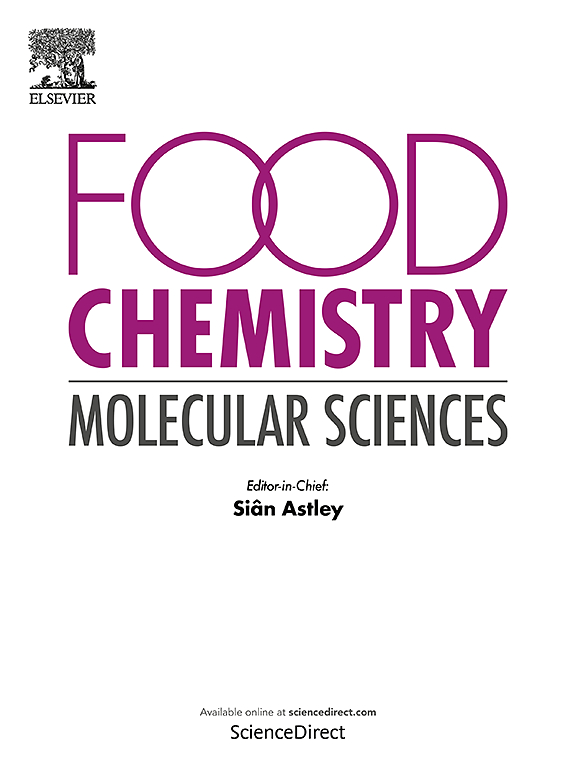结合广泛的靶向代谢组学和RNA测序,揭示白花蛇舌草果汁诱导家禽巨噬细胞的功能分析果汁诱导的家禽巨噬细胞
IF 4.1
Q2 FOOD SCIENCE & TECHNOLOGY
引用次数: 0
摘要
本研究探讨了栽培的和野生的大叶黄杨果汁(PEJ)对HD11家禽巨噬细胞系的功能影响,目的是开发栽培的大叶黄杨及其果实残渣作为家禽饲料添加剂的潜力。RNA-Seq 用于评估栽培和野生 PEJ 诱导 HD11 细胞的功能差异。栽培PEJ和野生PEJ都能通过组蛋白H1/H2家族基因调控细胞复制,通过Toll样受体7调控宿主免疫反应。野生PEJ抑制宿主巨噬细胞的M1型极化,而栽培PEJ则促进M2型极化。基于液相色谱-串联质谱的广泛靶向代谢组学鉴定了栽培和野生 PE 的代谢物。在 911 个代谢物中,有 238 个在功能上存在差异。这些数据为后续开发 PE 作为家禽功能性饲料添加剂提供了理论依据。本文章由计算机程序翻译,如有差异,请以英文原文为准。
Combining widely targeted metabolomics and RNA-sequencing to reveal the function analysis of Phyllanthus emblica Linn. Juice-induced poultry macrophages
This study explored the functional effects of cultivated and wild Phyllanthus emblica Linn juice (PEJ) in HD11 poultry macrophage lines, with the aim of potentially developing cultivated PE and its fruit residue as poultry feed additives. RNA-Seq was used to evaluate the functional differences between cultivated and wild PEJ induced HD11 cells. Both cultivated and wild PEJ could regulate cell replication by histone H1/H2 family genes and host immune response by Toll-like receptor 7 regulation. Wild PEJ inhibited M1-type polarization of host macrophages, while cultivated PEJ promoted M2-type polarization. Metabolites of cultivated and wild PE were identified by widely targeted metabolomics based on liquid chromatography-tandem mass spectrometry. Of the 911 metabolites, 238 differed functionally between cultivated and wild PE. The data provide a theoretical basis for the subsequent development of PE as a functional feed additive in poultry.
求助全文
通过发布文献求助,成功后即可免费获取论文全文。
去求助
来源期刊

Food Chemistry Molecular Sciences
Agricultural and Biological Sciences-Food Science
CiteScore
6.00
自引率
0.00%
发文量
83
审稿时长
82 days
期刊介绍:
Food Chemistry: Molecular Sciences is one of three companion journals to the highly respected Food Chemistry.
Food Chemistry: Molecular Sciences is an open access journal publishing research advancing the theory and practice of molecular sciences of foods.
The types of articles considered are original research articles, analytical methods, comprehensive reviews and commentaries.
Topics include:
Molecular sciences relating to major and minor components of food (nutrients and bioactives) and their physiological, sensory, flavour, and microbiological aspects; data must be sufficient to demonstrate relevance to foods and as consumed by humans
Changes in molecular composition or structure in foods occurring or induced during growth, distribution and processing (industrial or domestic) or as a result of human metabolism
Quality, safety, authenticity and traceability of foods and packaging materials
Valorisation of food waste arising from processing and exploitation of by-products
Molecular sciences of additives, contaminants including agro-chemicals, together with their metabolism, food fate and benefit: risk to human health
Novel analytical and computational (bioinformatics) methods related to foods as consumed, nutrients and bioactives, sensory, metabolic fate, and origins of foods. Articles must be concerned with new or novel methods or novel uses and must be applied to real-world samples to demonstrate robustness. Those dealing with significant improvements to existing methods or foods and commodities from different regions, and re-use of existing data will be considered, provided authors can establish sufficient originality.
 求助内容:
求助内容: 应助结果提醒方式:
应助结果提醒方式:


